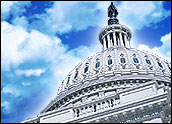
A bill to criminalize file-sharing on the Internet is moving rapidly through the U.S. Congress.
The measure — which last week was just a draft proposal circulating among members of the House Judiciary Committee’s Subcommittee on Courts, the Internet, and Intellectual Property — has been scheduled for action by that panel tomorrow afternoon.
Reportedly, the proposed law makes it easier for the U.S. Department of Justice (DOJ) to seek criminal prosecutions against file-sharers of copyrighted material. It also establishes jail time and fines for anyone who shares 2,500 or more pieces of content or distributes a single file worth more than US$10,000.
Moral Force
The House bill, whose sponsors remain uncertain, appeared after Sens. Orrin G. Hatch (R-Utah) and Patrick Leahy (D-Vermont) filed different legislation in the Senate. That legislation would extend the DOJ’s powers to file lawsuits in civil, rather than criminal, copyright-infringement cases.
“It is critical that we bring the moral force of the government to bear against those who knowingly violate the federal copyrights enshrined in our Constitution,” Hatch said in a statement. “But many of us remain concerned that using criminal law enforcement remedies to act against these infringers could have an overly-harsh effect, perhaps, for example, putting thousands of otherwise law-abiding teenagers and college students in jail and branding them with the lifelong stigma of a felony criminal conviction.”
He maintained that his proposal — called the Protecting Intellectual Rights Against Theft and Expropriation Act (PIRATE Act) — will allow the DOJ to supplement its existing criminal-enforcement powers through the new civil-enforcement mechanism. “As a result,” he said, “the department will be able to impose stiff penalties for violating copyrights, but can avoid criminal action when warranted.”
Prosecutors Hindered
“For too long, federal prosecutors have been hindered in their pursuit of pirates, by the fact that they were limited to bringing criminal charges with high burdens of proof,” Leahy added in a statement.
“In the world of copyright, a criminal charge is unusually difficult to prove because the defendant must have known that his conduct was illegal and he must have willfully engaged in the conduct anyway,” Leahy said. “For this reason prosecutors can rarely justify bringing criminal charges, and copyright owners have been left alone to fend for themselves, defending their rights only where they can afford to do so.
“In a world in which a computer and an Internet connection are all the tools you need to engage in massive piracy, this is an intolerable predicament,” Leahy declared.
Picking Up Tab for RIAA
However, some attorneys view the PIRATE Act as a way to have taxpayers pay for the lawsuit campaign being waged against file-sharers by the Recording Industry Association of America (RIAA).
“What it really does is shift the burden of enforcing civil liability to the Justice Department, which has never been done before,” Joseph Bernstein, an intellectual-property attorney with Wallenstein Wagner & Rockey in Chicago, said of the proposed act. “It takes the burden from the recording industry and puts it on the Justice Department.
“The Justice Department would be charged with vindicating the rights of the recording industry,” Bernstein told TechNewsWorld.
Sue America Campaign
Fred von Lohmann, a staff attorney with the Electronic Frontier Foundation in San Francisco, added, “I think it’s a terrible idea to have the American taxpayer essentially foot the bill for the RIAA’s ‘sue all American music fans’ strategy.”
Von Lohmann told TechNewsWorld that more lawsuits will not solve the problem. “There are more Americans using file-sharing software than voted for President Bush,” he said. “In that environment, lawsuits are not going to be the answer.”
Increasing penalties for an activity conducted by millions of Americans billions of times per year is counterproductive, agreed Adam Eisgrau, executive director of P2P United, a trade association for the makers of file-sharing software based in Washington, D.C.
“No one can seriously believe that that conduct is going to stop, regardless of the penalties,” Eisgrau told TechNewsWorld.
“Since artists and copyright holders aren’t making a dime on those hundreds of millions of downloads, it’s time to declare a halt on calling the public criminals and to start figuring out legislatively and otherwise how we start calling them customers,” he added.
Congressional Idiocy?
For his part, Frost & Sullivan IT industry analyst Jarad Carleton noted that “when you take a look at Congressional attempts to regulate technology, they usually end up with an ineffective law on the books.
“If Hatch and the rest of Congress thinks they can stop the theft of American IP by passing laws against it in one tiny corner of the globe, they are more idiotic than I’d ever imagined,” he told TechNewsWorld via e-mail. “Congress does not understand technology enough to effectively regulate it. That’s a fact.”





















































